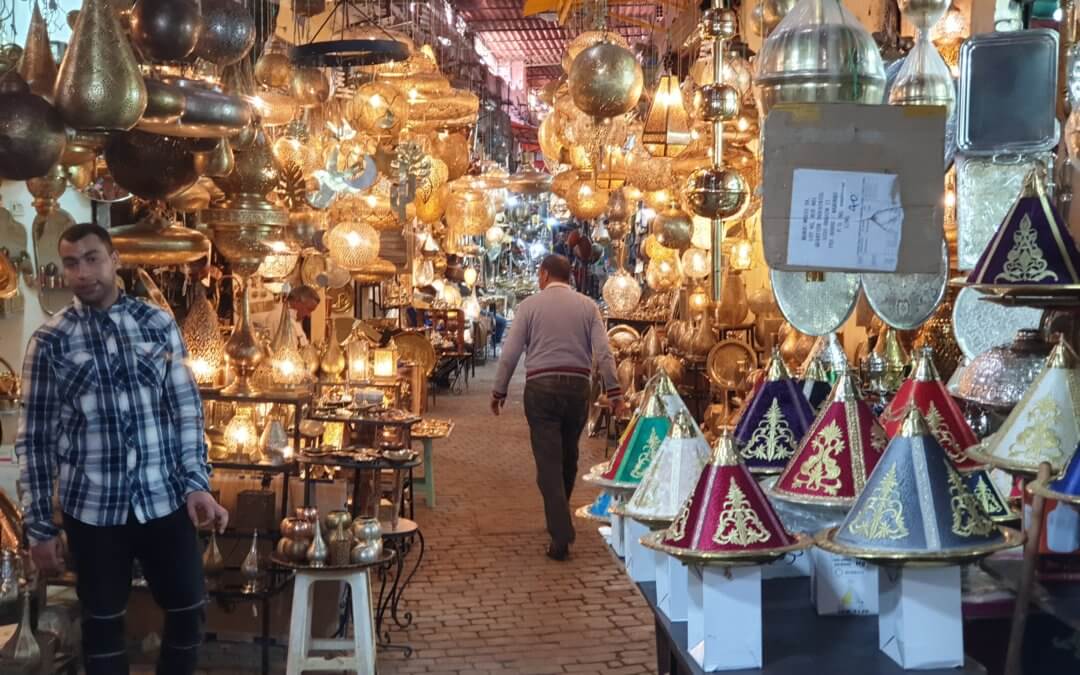This is part 2 of the story of our untimely travel to, experience in, and evacuation from Marrakesh, Marocco shortly after the outbreak of the coronavirus pandemic.
Everywhere you look in Marrakesh, there are cats. No one owns a cat here, even given the narrow definition of owning that regular cats allow, cats are just a part of the streets. They drink from the puddles of wastewater, eat whatever falls to the ground from one of the countless market stalls, and walk around aimless and disheveled but also endearing. Kind of like everything around here.
The markets of Marrakesh are something else entirely. Picture the stereotypical Arabian market, just like the one from Aladdin. A labyrinth of alleys, filled with something to shock and amaze every one of your five senses: the finest cashmere, next to the cheap fake one, the spices that make the hair in your nose tingle and retreat, the stinking tannery filled with ridiculously well-made backpacks and wallets all from genuine leather,—at least considerably better than what you find in brand stores nowadays— the lanterns district which, completely unlike its Amsterdam counterpart, actually sells lanterns, and stalls selling antiques or unique objects brought by from Sahara by the Bedouins. Getting lost in this labyrinth, at it really is a labyrinth, no Google Maps—if I can spoil the Arabian night image with the mention of technology—because the marketplace of Medina shifts and turns, like a living thing, adjusting the paths and passages as the need arises.
There’s only one downside: everyone wants to sell you something. You’d say that’s kind of the purpose of a marketplace, is it not? But nowhere have I experienced so much pressure to buy as here. Everyone is someone’s cousin, and you might think you’re interested in that neat handicraft store you just spotted. Still, cousin Abdul knows better and promptly leads you to look at his cousin Yusif’s carpet store, where of course, you know that the whole family is poor and you, and this beautiful carpet, is all that stands between them and starvation. You don’t need a bloody carpet, so you walk away because, honestly, you would have to buy drapes to match, but you still feel like you have just sentenced a small tribe to death. To the salesmen though, this is just a common tactic. I’ve met my match.
You see, I have a reputation amongst my friends for being good at haggling and negotiation. Sometimes they send me to buy things when large sums of money are involved. Honestly, there isn’t much to it. You begin by asking for a lower price.
So, this is how it went, with one of the traveling Bedouin. The object of negotiation was a beautiful, hand-crafted, cross of the desert. A symbol of luck and in their culture. I opened with:
“How much for this one?”
“You ask how much, but you need to understand that this no simple object. This is the cross of the desert, hand made by my tribe. Copper, ebony wood, real silver. It is beautiful, is it not?”
“Yes, I think it is.”
“And do you notice the pattern on the side? Every tribe has its pattern, and this one is the symbol of my tribe. This object is a gift, my friend, my gift to your house. From me to you.”
I can’t help but smile. “But I wouldn’t feel good taking it from you. Can you at least name a price?”
“Yes, but only because you ask. It is sixteen hundred dirham.” (160 euro. 1 euro is around 10 dirham)
“Ouch, that’s a bit much, don’t you think?”
“I named the price only because you asked. But is okay. You name the price.”
“I wasn’t planning on spending that much, and I don’t want to offend you.”
“Offend? My friend. No offend. We talk, we smile, no offend, yes?”
“Okay, what about three hundred dirhams?”
“Why so low! Have I not told you the value of this cross? Take this home, and you would bring good luck and the spirit of the Sahara with you.”
“I understand, but I don’t really need a cross of the desert. It is a well-made work of art, no doubt about it, but I don’t think I can offer a fair price.”
“Of course you can. Name a price.”
“Maybe three hundred and fifty?” I say with a hopeful look from under my eyebrows. “It’s a beautiful object, but I don’t want to spend all my money in one day.”
“Three hundred fifty, good price, I can give you smaller one.”
“No, thank you. I don’t think we’ll agree.”
“We will, we will. I tell you what; you’re real special. First customer of the day, that’s good luck for me. Five hundred. It’s a deal.” The Bedouin’s robes flittered about him as he busied himself with finding some packing paper.
“No, sorry. That doesn’t cut it for me. I am sure you will be able to find someone to take this lovely cross home.”
He calls something to his assistant. I think I catch the Arabic word for “negotiates” and “Berber” (one of the tribes).
As I walk away he chases me down, arms extended, cross packed, beaming and saying “four hundred fifty!” but we don’t reach an agreement because, to begin with, I just wanted to find out the price of the item, to consider whether I want it or not, not to splurge on the first day.
Now, if that were just one guy, in one shop, it would be a neat story to tell. But this is how every single one behaves. I shit you not. Every lamp, every wooden box, every belt, every lantern is a precious piece of some tribe’s heritage that they are willing to part with for a small fortune (or a considerably smaller fortune if you buy multiple items). Feigning friendship, and offense, talking about starving families and how they’re desperate for money, but can’t part with this unique Berber knife for less than a hundred euros, that’s all a part of the ritual of making a sale.
And everything, absolutely every object on display, and the displays are pretty much overflowing with stuff, is so ridiculously overpriced that the full price is perhaps paid only by prude British tourists easily cornered.
All in all, the first day of our stay in Morocco was nothing short of amazing. The Medina markets are where I was supposed to be born. I would be one of the fat fur merchants, wearing too many jewels on their fingers, and amazing passersby with tales of wild beasts the hides were taken from. Alas, I was born in the wrong part of the world and graduated Computer Sciences. And the online sales are not half as pleasurable as the person to person sort.
There is one incident on our way back to the hotel, that makes me scratch my head and wonder if coming over was such a great idea after all. Some kids chase us down the street, crying, “Corona! Corona!”
They closed the borders the following morning.
Thanks for reading! If you enjoyed this article, please share it with someone who may enjoy it too.

